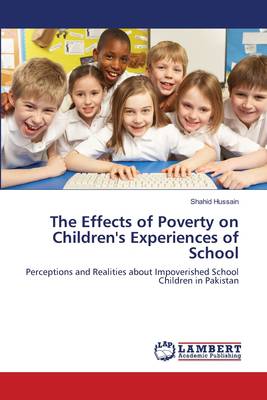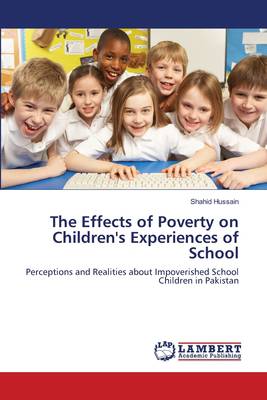
Door een staking bij bpost kan je online bestelling op dit moment iets langer onderweg zijn dan voorzien. Dringend iets nodig? Onze winkels ontvangen jou met open armen!
- Afhalen na 1 uur in een winkel met voorraad
- Gratis thuislevering in België vanaf € 30
- Ruim aanbod met 7 miljoen producten
Door een staking bij bpost kan je online bestelling op dit moment iets langer onderweg zijn dan voorzien. Dringend iets nodig? Onze winkels ontvangen jou met open armen!
- Afhalen na 1 uur in een winkel met voorraad
- Gratis thuislevering in België vanaf € 30
- Ruim aanbod met 7 miljoen producten
Zoeken
The Effects of Poverty on Children's Experiences of School
Perceptions and Realities about Impoverished School Children in Pakistan
Shahid Hussain
Paperback | Engels
€ 48,45
+ 96 punten
Omschrijving
This book investigates the premise that Poverty influences children´s lives in different ways in the public schools of Pakistan, but there is little information about, and understanding of, how poverty-stricken children experience school as opposed to children from better off families. The findings of this study reveal that the school experiences of poor children are not as good as the school experiences of better off children. The parents of poor children do not have enough resources to meet the educational expenses of their children. Furthermore, the findings suggest that poverty that is due to lack of financial resources affects the experiences of children at school, but there are also some other socio-emotional factors which results from poverty such as conflicting relationships with peers and teachers. Therefore, the findings of this study can prove very beneficial for the policy makers in helping them take broader social policy initiatives for reducing poverty and inequality, so that the lives of the poor children could be improved in the public schools of undeveloped countries like Pakistan.
Specificaties
Betrokkenen
- Auteur(s):
- Uitgeverij:
Inhoud
- Aantal bladzijden:
- 76
- Taal:
- Engels
Eigenschappen
- Productcode (EAN):
- 9783659212499
- Verschijningsdatum:
- 17/08/2012
- Uitvoering:
- Paperback
- Formaat:
- Trade paperback (VS)
- Afmetingen:
- 152 mm x 229 mm
- Gewicht:
- 122 g

Alleen bij Standaard Boekhandel
+ 96 punten op je klantenkaart van Standaard Boekhandel
Beoordelingen
We publiceren alleen reviews die voldoen aan de voorwaarden voor reviews. Bekijk onze voorwaarden voor reviews.











